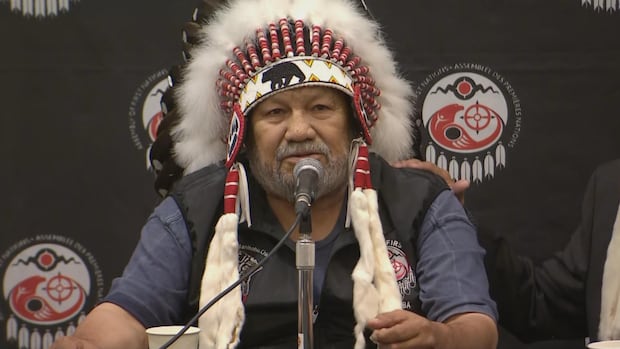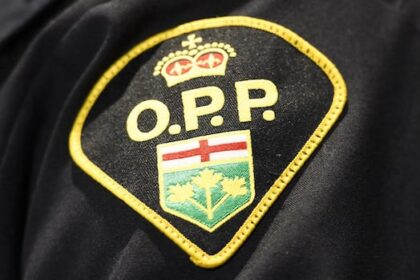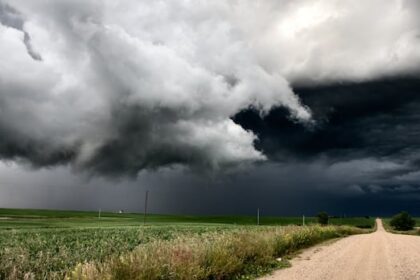Manitoba·UpdatedA Manitoba First Nation is pressing the federal and provincial governments to fund a generator that can provide temporary electricity to the remote northern community that’s been under an evacuation order for more than 100 days.’We gotta get home, our children are suffering’: Chief Gordie BearMathias Colomb Cree Nation Chief Gordie Bear says the First Nation in northern Manitoba needs a generator to restore temporary power, but the provincial and federal governments have not committed to funding. (Trevor Brine/CBC)A Manitoba First Nation is pressing the federal and provincial governments to fund a generator that can provide temporary electricity to the remote northern community that’s been under an evacuation order for more than 100 days.Wildfires forced thousands of residents from Mathias Colomb First Nation — also known as Pukatawagan — at the end of May when flames encroached within a kilometre of the remote and fly-in community about 700 kilometres northwest of Winnipeg. For some residents, it’s now been more than three months since they last set foot inside their homes, the longest-running evacuation in the province this wildfire season.The threat of the wildfire has receded for weeks, but Pukatawagan has been waiting for electricity to be restored in the First Nation to bring residents home after hydro infrastructure burned.”We gotta get home, our children are suffering,” Chief Gordie Bear told reporters at a news conference on Friday. “There has to be a solution … there’s gotta be some way to ease the pain.”Pukatawagan Cree Nation evacuees arrive in Brandon in late May. For some residents, it’s now been more than three months since they last set foot inside their homes, the longest-running evacuation in the province this wildfire season. (Chelsea Kemp/CBC)Crews from Manitoba Hydro have repaired some structures, but Pukatawagan is not expected to regain power until the main electrical lines are restored. A spokesperson for the utility said in an email Friday it expects to have partial power restored to critical infrastructure in the community on Sept. 11, and full power restored the week of Sept. 28.”We are focusing our efforts on safely restoring power as quickly as possible,” the email said, adding that nearly a hundred poles are still damaged or destroyed, many in remote, hard-to-access areas accessible only be helicopter.Bear says Pukatawagan has a plan: Set up a generator to bring temporary electricity to homes, and let evacuees return the First Nation while Manitoba Hydro restores full power.However, requests for funding for the $8-million device have not been granted by either government, Bear says. Indigenous Services Canada told Bear it was Manitoba Hydro’s responsibility to source power.The chief says he has met with Minister Adrien Sala, who is responsible for the Crown corporation, countless times but there has been no commitment on the funding. Sala said Friday Manitoba is in talks with the federal government for alternative options, but that the province’s focus is on the repairs, which he said was the fastest way to get Pukatawagan residents home.”Hydro has actually worked with a consultant and the communities to look at developing options around generators,” he said. “Again, that’s a longer-term conversation. Right now, the focus remains on getting power restored.”CBC News has reached out to Indigenous Services Canada and Manitoba’s provincial government for comment. Manitoba Hydro told CBC in mid-August they are not installing a generator while they focus on repairs: directing personnel and resources to restore the electrical grid. ‘They have failed this nation’Glenn Dumas, Pukatawagan’s fire chief, says the government has spent more than $160 million to take care of evacuees, far greater than the $8 million needed to set up the generator. “I find myself losing a battle because of Hydro and the governments not willing to work together to ease the suffering and the pain,” Dumas said. “Step up or step out of the way and let somebody else that can do the job do it.”A number of Pukatawagan residents have lost their lives while under evacuation, and their return is important for the safety of the community, he said. Manitoba Keewatinowi Okimakanak Grand Chief Garrison Settee says he has sat with ministers in the legislature building to address this issue, but nothing has changed. “They have failed this [First] Nation. They have ultimately failed these people,” he said. “We have to take them home and we must start today.” Assembly of First Nations National Chief Cindy Woodhouse-Nepinak expressed support for the First Nation, asking both levels of government to negotiate a deal with Pukatawgan’s leadership as soon as possible. “It shouldn’t be that difficult,” Woodhouse-Nepinak told reporters. “Their people are waiting, and they want to get home just like the rest of us.” ABOUT THE AUTHORSantiago Arias Orozco is a journalist with CBC Manitoba currently based in Winnipeg. He previously worked for CBC Toronto and the Toronto Star. You can reach him at santiago.arias.orozco@cbc.ca.With files from Matt Humphrey
Friday, 6 Feb 2026
Canada – The Illusion
Search
Have an existing account?
Sign In
© 2022 Foxiz News Network. Ruby Design Company. All Rights Reserved.
You May also Like
- More News:
- history
- Standing Bear Network
- John Gonzalez
- ᐊᔭᐦᑊ ayahp — It happened
- Creation
- Beneath the Water
- Olympic gold medal
- Jim Thorpe
- type O blood
- the bringer of life
- Raven
- Wás’agi
- NoiseCat
- 'Sugarcane'
- The rivers still sing
- ᑲᓂᐸᐏᐟ ᒪᐢᑿ
- ᐅᑳᐤ okâw — We remember
- ᐊᓂᓈᐯᐃᐧᐣ aninâpêwin — Truth
- This is what it means to be human.
- Nokoma











